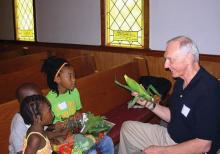Question: Do you recommend nonclinical careers for family physicians?
Dr. Hakkarinen: In general, I’d say do what you want and do what you can. If you’re happy and enjoying clinical medicine, I don’t think a nonclinical career is in any way by itself better than a clinical career. I think that your circumstances can change. I just think people need to recognize that you can be happy and satisfied doing either.
Question: Do you have any advice for today’s family medicine residents?
Dr. Hakkarinen: I would encourage today’s family physicians to keep the faith and look to find where they fit. There are plenty of places in the country that are crying for family physicians and will be eager for them. I don’t think there’s any dearth of opportunity anywhere.
Family practice has in some sense lived up to our expectation in that it is now an integral part of medicine. We’ve had surgeons general who are family physicians. We have medical school deans who are family physicians. With the exception of a very few medical schools, there’s full acceptance. But that means you’ve got to have continued standards and continued excellence.
Embracing Change: Dr. Daniel R. McCready
Dr. Daniel R. McCready was a 2nd-year family practice resident at Wilmington (Del.) Medical Center in 1971. He started out in solo practice in Virginia Beach in 1976, and over the years his practice grew to include several physicians and nurse practitioners.
In the early 1990s, the practice faced financial pressure. "The expenses were going up, and the reimbursements from the various third-party payers were going down," he said. "It was a bad situation." The solution came in the form of a partnership with the local hospital.
In 2009, Dr. McCready retired from clinical practice, at least for now. "On the very last day of work, I still enjoyed seeing patients the way I did when I was a family practice resident," he said. "It’s wonderful to be able to interact with people one on one."
Question: You were on the ground floor as family medicine got started as a specialty. Is it as relevant today?
Dr. McCready: I don’t see any real change. I think it’s good for people to have a primary doctor – the patient knows the doctor, and the doctor knows the patient and the patient’s family. There’s something very useful about that, because you then have this background of understanding that you can’t get when you just see a different doctor each time. The continuity is very useful in keeping things in context. I think maintaining that personal, quality, doctor-patient office visit is still as important now as it was then.
Question: When you look back, what were some of the biggest surprises for you?
Dr. McCready: I think a lot of things happened between 1971 and 2009 that I hadn’t expected. For example, when I first went into practice, it was the old idea that the doctor and the patient had this doctor-patient relationship. Also, for medical services rendered, the patient felt that it was between the patient and the doctor. As time went on, the third party became the one that started paying the bills, instead of the patient. Then we had the HMOs, then the managed care and gatekeeper idea.
With a lot of things that have happened, doctors initially have been surprised, shocked, concerned, and not sure what to do. But by our nature we have to be adaptable, because the landscape is constantly changing.
So urgent care centers came and went, and then we had diagnostic-related groups for hospitalized patients and that took awhile to get used to. Then you saw the advent of fewer and fewer doctors being in solo and small-group practices, and more and more doctors being affiliated with a hospital-based entity. I think that’s even truer now than ever. Then the electronic health record came in.
Question: What were the aspects of your career that you most enjoyed?
Dr. McCready: I always enjoy knocking on the door, going in, saying hello to the patient, and having that one-on-one interview. I was trained by my professor of medicine at the University of Maryland, Dr. Theodore Woodward, who said, "You just have to listen to the patient, and the patient will tell you what’s wrong most of the time." That ability to just go in and listen to people tell their story, I never got tired of that.


